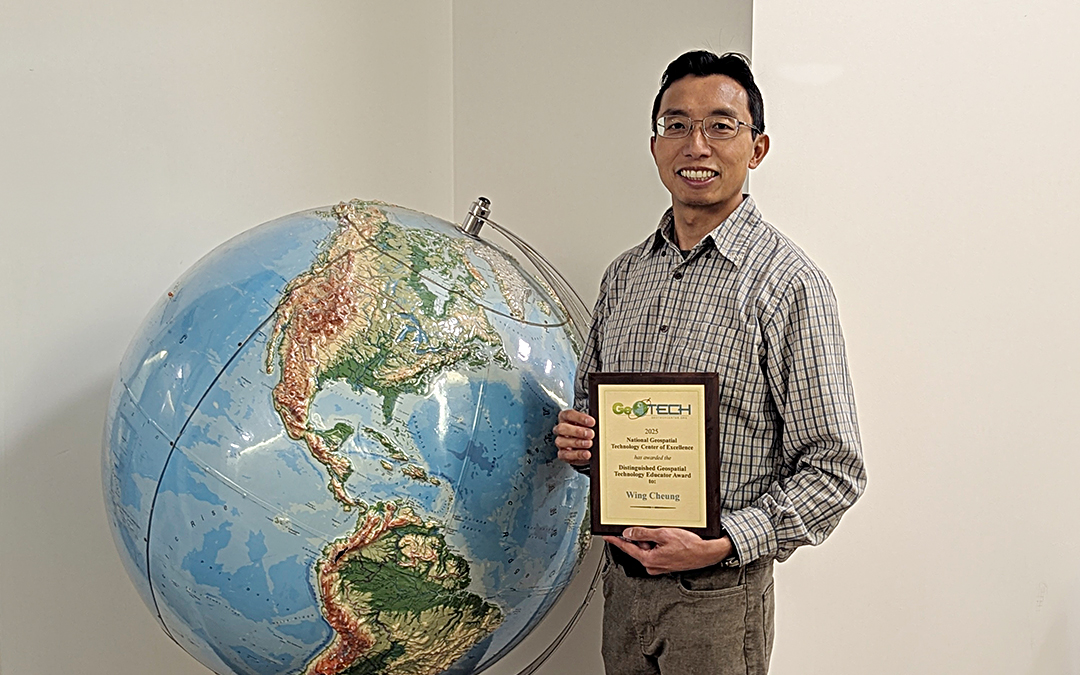SAN MARCOS, CA (September 11, 2025) — When Wing Cheung, a geography and Geographic Information Systems (GIS) professor at Palomar College, attended a conference of geospatial educators, he had no idea what was in store for him.
At the June conference held in Gettysburg, Pa., Cheung was honored by his peers with a Distinguished Geospatial Educator Award from the National Geospatial Technology Center of Excellence, which is funded by the National Science Foundation (NSF).
“I was shocked to get the award because these are people who are colleagues I’ve worked with for many years,” he said. “They were all tightly lipped.”
Cheung received the award in large part because of his work to seek official designations (i.e. standard occupation classification codes) from the U.S. Bureau of Labor Statistics for occupations in the geospatial field, such as GIS technician, GIS analyst, or GIS technologists.
The government data, which lists 867 detailed occupations, is important because education programs need to show that jobs exist in their fields. Employers also use the data for creating job postings and determining salary levels.
It’s a long and complicated process to get the new standard occupation classification (SOC) codes included. The Bureau of Labor Statistics only updates the SOC system every 10 years, with the next update occurring in 2028. The update process began in summer 2024, when Cheung collaborated with leaders of numerous geospatial professional organizations in a workgroup to ensure agreement on the new proposed job codes.
Cheung worked to write and submit the workgroup’s public comments during a 60-day period, part of the 37,507 public comments that the bureau received. The bureau’s reply is expected in 2026, with final implementation two years later.
“It’s a very involved process,” he said.
Cheung also produced course curriculum that he has been sharing with the technology center that gave him the award. He is a proponent of service learning, combining community service with what students learn in his classes.
Students in Cheung’s introductory GIS course are given the option of completing a project in which they partner with community organizations such as the Escondido Creek Conservancy or San Diego Food Bank. Students who worked with the conservancy, for example, surveyed trees to find out which ones had been infected by the Goldspotted Oak Borer Beetle.
“The students are performing a community service, and they’re applying what they learned in the classroom to solve real-world problems,” he said.
Cheung started teaching geography and GIS at Palomar College 18 years ago. He was instrumental in the development and launch of the drone technology certificate of achievement in 2016, and later the associate in science was established. The program also offers a non-credit certificate of competency, which centers on drone safety.
Dedicated to the success of the program, Cheung has been serving as a co-coordinator of Palomar College’s drone program. He said he will be focusing his efforts on revising the noncredit program to emphasize drone use in geospatial applications. This summer, he traveled to American Samoa to teach high school students how to program drones to fly autonomously, and how to create 3D models of objects using drone images.
He will also be leading efforts in Palomar College’s share of a $1 million three-year NSF grant with Southwestern College to increase the number of land surveyors prepared to enter the workforce. “The median age of Land Surveyors in many states is near 60 years old. There is a desperate need for students to join the land surveying profession in San Diego County, and really, in the entire country,” said Cheung.
To address this challenge, the NSF grant aims to increase the number of high school and college students in the San Diego region who are interested in pursuing land surveying as a career. Specifically, Palomar College, under Cheung’s direction, will lead the introduction of land surveying and the hi-tech tools used in the profession to high school students with week-long summer camps and noncredit courses.
The award that Cheung received may have been a surprise to him, but it was certainly well-deserved.

